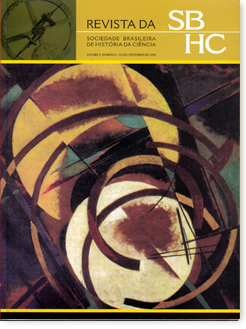A discourse about science, religion and liberty in the Second Empire
The Soul and the Brain of Gonçalves de Magalhães
Keywords:
regency, romanticism, positivist, evolutionistAbstract
The narrow relations between the Brazilian Romanticism and the project of nation building elaborated by literates in the Second Regency are well known. Domingos José Gonçalves de Magalhães was one of the founders of the project that has as a goal not only the constitution of a national literature, but also the formation of the cultural field for the imperial society. The effort of such a cultural project could affect modes of decision making, values, forms of knowledge, conceptions of social order, and the organization of the State. This article aims to make a case-study of a work written by Gonçalves de Magalhães on physiology and psychology, where he defends the liberty of the soul, against sensationalism and materialism as the form of knowledge of man. The book, entitled The soul and the brain, was written in 1876 in a period when secular and evolutionist theories were conquering space. Magalhães’s work had a negative reception among the new generation, which was already making critics not only of the scientific and philosophical canons of the Empire, but also of the entire slavery order. Considered by these criticizers as a pseudo-scientific work, however, the study provides elements to discuss the interconnections that he established for philosophy, sciences and moral values, and his choices made to question the imperial society and his ideal of nation.


